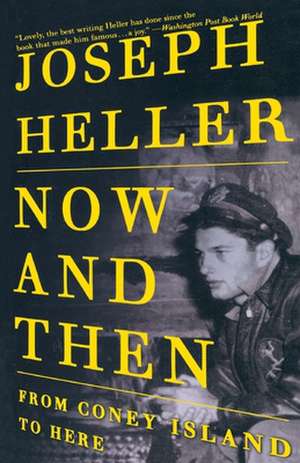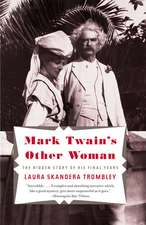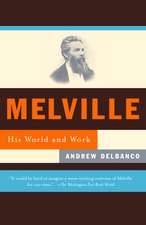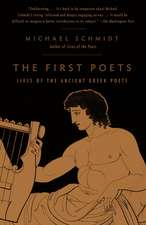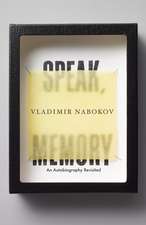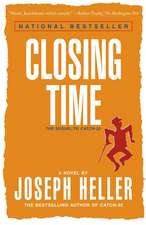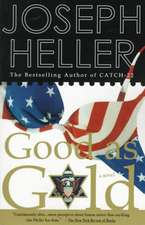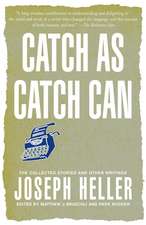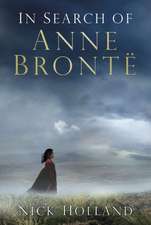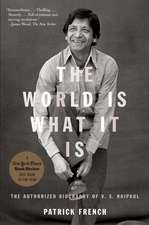Now and Then: From Coney Island to Here
Autor Joseph L. Helleren Limba Engleză Paperback – 31 dec 1998
Happened, comes a slyly funny, vastly revelatory memoir that is at once a loving
evocation of a lost America and an exploration of the frontier where life turns
into literature.
Now and Then follows Joseph Heller from his fatherless childhood on the
boardwalks of Depression-era Coney Island, where he grew up amid the rumble of
the Cyclone and the tantalizing aroma of Mrs. Shatzkin's knishes. It offers a
dizzying bombardier's-eye view of the sky over wartime Italy, where Heller
encountered the characters and incidents he would later translate into Catch-22.
It depicts a writer coming to terms with both rejection and celebrity. Here, in
short, is a life filled with incident and insight, recollected with subversive
humor, exquisite timing, and a fine appreciation for the absurd.
Preț: 97.46 lei
Nou
Puncte Express: 146
Preț estimativ în valută:
18.65€ • 19.52$ • 15.43£
18.65€ • 19.52$ • 15.43£
Carte disponibilă
Livrare economică 15-29 martie
Preluare comenzi: 021 569.72.76
Specificații
ISBN-13: 9780375700552
ISBN-10: 0375700552
Pagini: 259
Dimensiuni: 140 x 216 x 20 mm
Greutate: 0.36 kg
Editura: Vintage Books USA
ISBN-10: 0375700552
Pagini: 259
Dimensiuni: 140 x 216 x 20 mm
Greutate: 0.36 kg
Editura: Vintage Books USA
Recenzii
"Lovely, the best writing Heller has done since the book that made him famous.... A joy." --Washington Post Book World
"Mouthwatering, elegantly written, lovingly detailed." --The New York Times Book Review
"A lovely, moving, affirming, celebratory work of courage, clarity, insight and joy."--The Sun [Baltimore]
"Mouthwatering, elegantly written, lovingly detailed." --The New York Times Book Review
"A lovely, moving, affirming, celebratory work of courage, clarity, insight and joy."--The Sun [Baltimore]
Notă biografică
Joseph Heller lives in East Hampton, New York.
Extras
From Chapter One
The Gold Ring
The gold ring on the carousels was made of brass. Even as kids in Coney Island we didn't believe it was the real thing. By the time we'd grown old enough to ride the outside horses and lunge out sideways to grasp the metal rings that swung toward us for the final few rotations, the carousel was no longer enchanting and we had no deep desire for the free ride that the last, lucky gold one awarded. By then we had nickels enough to go around again if we wanted to, but we tended to spend them on attractions that were higher and faster, more spectacular--roller coasters--and, for fun, the electric bump-cars.
We were luckier with the staying power of our craving for things like pretzels, potato chips, jelly doughnuts, and chocolate bars. Mark Twain is said to have remarked that by the time we're tall enough to reach the jar of jam on the high shelf of the cupboard, we find that we've lost our taste for jam. No such rueful fate struck me or my friends or any in the small family of four of which I was the youngest, not with edibles like halvah or salted peanuts, ice cream, kosher corned beef and hot dogs, or even salami sandwiches. When we found ourselves with enough cash to obtain as much of these delicacies as we wanted, we still had a hearty appetite for them, and we tended to indulge ourselves, and still do, by eating as much as, sometimes more, much more, than we truly did, and do, want.
Of late, my best defense against corpulence has been to keep out of the house supplies of things to eat that reason cautions I shouldn't be stuffing into myself. Pistachio nuts, for instance, whether in petite jars or five-pound bags, have a feeble chance of extended survival once I discover them close at hand. If there's ice cream in the freezer, I feel a commanding moral responsibility to move it out of the house as quickly as I'm able to swallow as much as is there. Lately, I've discovered that salty pretzels go very well with just about any dessert I am likely to have at home. They're also good by themselves. If, before going to bed, I happen to remember we have sliced turkey breast in the refrigerator, the odds are heavy that I'll put some in my mouth as I find my way into the bathroom to brush my teeth--on a couple of crackers, of course, or half a flat of pita bread, with salt and mustard.
But it's ice cream that still tastes most wonderful and is richest in evocative associations extending backward in time almost to the formation of memory itself, to brands and items long extinct--to Dixie cups, for example, with their prized photographs of cowboy movie stars on the inside of the lid under a transparent waxed-paper seal. Like the evocations of the cookie to Proust, a meditation on ice cream soon takes me back to the age of eight or nine and into a family setting in which a small container is shared with bliss by the four of us, a mother, a sister, a brother, and me. (I was by many years the youngest.) In summer, ice cream was everywhere. In autumn, though, after the change back from daylight saving time, and even in winter on a black night after dinner and before bedtime, the idea of ice cream might be voiced, taking on a sacramental meaning to our small family in our small apartment--four rooms, looking out on West 31st Street near Surf Avenue in Coney Island. My mother--finally relaxing in front of the radio with the rest of us, after shopping for dinner, preparing dinner, serving dinner, and cleaning up in the kitchen after dinner--might say with her Jewish intonations that she would certainly very much welcome the taste of a little ice cream. We had no refrigerator then, no freezer--no family living in our apartment building did--and there would be no ice cream in the house. At that late hour only the soda fountain in a drugstore two blocks away was open. I was the one who would volunteer to go. I would be given a dime to bring back a container. The flavor of our unanimous choice in those years was called Golden Glow. It's hard today to believe that just half a pint of bulk ice cream could have been so satisfying to the four of us, but that's all, as I recall, that a dime paid for. More than a dime for ice cream they couldn't bring themselves to spend. We were prudent with money because we didn't have much, but I, the "baby" in the family, was never allowed to feel that.
My sister, Sylvia, was seven years older than I. My brother, Lee, originally Eli, born in Russia and brought to this country at the age of six, was seven years older than she was. In reality, they were only my half brother and half sister, the children of my father and his first wife, who had died. My mother was therefore a stepmother to them. They were, I realize only now, technically orphans, and although they never said so, they must have felt at least a little like orphans. I was, then, the baby in the family, treated by everyone, in effect, like an only child, which in some ways I was.
I had no inkling of these family relationships until I was well into my teens, and I was shocked nearly speechless when confronted by the discovery, which unfolded at my brother's wedding. There, my mother's role in the procession down the aisle was to walk behind him, alone, and I listened dumbfounded to the officiating rabbi praise her so generously for the loving care she had given the groom, the son who was not biologically her own, and the daughter, too. I felt victimized, disgraced. My response to rage then, as it chiefly is still, was to break off speaking to the person offending me. I stopped speaking to my sister one time when she took up cigarettes and another time when she bleached her hair. And this time I may have fallen silent with all three of them, possibly with so deep and vindictive a hurt that I would obstinately refuse to tell any of them the cause, for that would be speaking. My oldest friend in the world, Marvin Winkler, with whom as an infant I had often been lodged together in a playpen, was amazed not long ago when I recalled the incident and related my stunned reaction. He was puzzled by my surprise, for he had been informed of the relationship by his mother when he was still a child and cautioned against hurting my feelings by bringing it up. My sister, too, was taken aback to read my account of this event in a biographical piece about me for which she had also been interviewed. She, along with my mother and my brother, had simply assumed, she claimed, that I'd known all along. It was not a scandal, not even a secret. They didn't talk about it because there was no need to.
On the other hand, I know it is true that neither my brother nor my sister ever said anything at all to me about my father, least of all about an earlier marriage, until out of curiosity as an adult I began to inquire. And only once did my mother talk to me about him, volunteering the information that my father could eat a whole chocolate cake at a single sitting--as a delivery driver for a wholesale bakery firm, cakes were easy for him to obtain--and that before he went into the hospital with a bleeding gastric ulcer, his stool was as black as coal. She told me this as an admonition against my own appetite, for I could always eat as much cake as was given me, and still want more. I discovered early in life that shelled walnuts in a bowl of raisins make a lovely late-evening treat for uninterrupted munching till bedtime. I once overheard my mother recounting that when I was a nursing infant, she had to tear me away from the breast, for I would never finish, and I can believe her.
Different as each of us was from the others, and however much there was inside us that we didn't want to talk about, we were, and functioned as, a close family. It was not in our nature to complain, quarrel, demand, or gossip. I remember a number of tantrums I discharged as a juvenile, but I believe that from the time I was an adolescent, I had acquired the family's stoic, resigned, and undemanding nature and didn't complain, quarrel, or gossip, either. My mother, finding herself after six years of marriage a widow with three children, two of them not naturally her own, had brought us up as the mother of us all, and my brother and sister had related to her as such. My brother, I learned, had at one time saved up money enough to buy her a better radio. The gift was poignantly apt, for my mother loved melodic music, Puccini arias in particular. And in those days of radio entertainment, amid the glorious profusion of comedy and variety shows, there was an opulence of weekly broadcasts featuring short selections from opera and other light classical pieces.
Although the period was one of severe economic depression, everybody sooner or later seemed able to find employment. By the time I started school, my brother, fourteen years older than I, was already working at a brokerage in Wall Street as a customer's man, a job for which he was to prove ill suited by his modest manner and unaggressive temperament, and by a disposition to be continually obliging to others. My sister, after graduating from high school and encountering a number of startling rebuffs at employment agencies, would eventually find herself starting at R. H. Macy's department store, where she would remain for something like forty years. And I at sixteen, after classes at high school, would be cutting a dashing figure in a khaki quasi-military uniform as a part-time messenger boy delivering telegrams for Western Union, in office buildings in Manhattan weekdays, on a bicycle weekends to residences in Brooklyn, and mostly exulting in my duties with a sense of adventure and attentive curiosity. My mother, who had been a seamstress and something of a dressmaker before her marriage, worked steadily at home at her sewing machine mending garments for neighbors and doing alterations for a cousin, Sadie Pacon, who owned a dress shop on Gravesend Neck Road in lower Flatbush nearby. She also found steady work at home from laundries, turning frayed collars on men's shirts so that, from the outside and at the neck at least, the shirts looked almost good as new. Some weekend nights, mainly Saturdays, my brother would find extra income filling in at a catering hall for some banquet, dressing up appropriately for his suave role in the cloakroom or as one of the hall's hosts greeting and directing arriving guests. Neighbors outside the apartment building seeing him depart in a tuxedo or a natty, double-breasted, summer sport jacket might remark that he was off on a heavy date. But I knew he was going to work.
My mother liked to read. In Europe, her family had been bookbinders. From the Coney Island public library I would bring her Yiddish translations of novels. She enjoyed Tolstoi, especially Anna Karenina, with which she had long been familiar, and thought Dostoyevsky was crazy. Her brother (my Uncle Sam) late in life was employed repairing books for the library of Brandeis University, where his son, Harry Stein, a varsity player in James Madison High School in Brooklyn and City College in New York, was one of the athletic coaches.
When my mother noticed an apple turning soft she would briskly plan a noodle pudding that made use of it rather than have it go to waste. She took threadbare bedsheets to her scissors and her sewing machine and converted them into window curtains. (Often, as her eyesight weakened with age, I would help with the sewing by threading her needle. Today I would not be able to.) If brother and sister had quarreled, she wouldn't let them go to bed until they had talked it out and made peace. She was never more happy than when a friend from the old country appeared unexpectedly. The visit to Coney Island of a Mrs. Rosen filled her with joy.
My sister's clothing as a teenager in high school, she recalls, came to her mainly as hand-me-downs from an older first cousin, who, because she was already at work in a business with her father, favored dresses of dark color, which my mother altered to fit. She also remembers feeling endlessly self-conscious, because she wore dresses rather than the skirts with blouses or sweaters fashionable among her schoolmates. Widowed twice, she is esteemed by a stepdaughter from her first marriage and by the three children from her second, all of them grown now.
For a little while, far back before the age of sixteen, out of eagerness more than need, I hawked newspapers in the early evening, peddling the next morning's editions the night before, crying, "'Merican, News, and Mirror, morning pape'!" The American, a Hearst newspaper more reactionary than his Mirror, was thicker than the others, cost more, and had few readers in the Italian and Jewish neighborhoods I traversed in my desperate hurry to keep ahead of other newsboys who were trying desperately to keep ahead of me. I soon dropped that heavier paper from my inventory, and my sales cry became "Hey, get your morning News and Mirror, morning pape'!" At best this was very small stuff, and I was lucky if I earned as much as a dollar. I bought the papers for a penny and a half, I think I remember, and sold them for two cents each, hoping for an occasional tip of a penny or two. People who wanted both might give me a nickel. I bought the papers from trucks near the subway station at Stillwell Avenue, usually eating a frankfurter while I waited for them to arrive, and wended my way home on a route along the boardwalk and the populous avenues of Surf and Mermaid in the hope that my last batch would be entirely gone by the time I got there. If not, a humorous, audacious plea to neighbors sitting outside their houses might do the trick. "Extra, Extra! Hitler dies . . . his mustache!" was one shouted ploy to command immediate attention. Any papers that remained I might give away to mothers and fathers there who were my favorites.
A wondrous incident remains indelibly alive--it occurred only one time. At a boardwalk Irish bar one night, a thin man sitting alone at a table beckoned to me and reached out for one of my papers. As I stood there and waited in suspense, he opened it from the back, studying the racing results a few moments, and then returned it. And then he gave me a dime and wanted no newspaper. I was in heaven, strolling on air as I went back outside. I was in love with a world that had such humans in it.
From repeated personal experience I've learned that few pleasures are so thoroughly reinforcing to the spirit as the arrival of unexpected money. Not long ago, I was amazed to receive in the mail, with no advance word, a royalty check from my literary agent for almost $18,000, representing cumulative royalties over the years from the publication of one of my novels in East Germany. I had long since forgotten that I'd even had a novel published there, and for the next hour or so I found myself grinning and humming a happy show tune or two. But I doubt very much that the sensation of well-being I experienced from this relatively huge windfall surpassed the joy brought me by that ten-cent gift I once received as a newsboy. It feels now as though that dime meant enormously more to me, and perhaps it did.
Each of these benign surprises affecting me was a rapture someone born rich is not likely ever to enjoy. There are some pleasures money can't buy. Our street and neighborhood felt safe, insular, and secure, to a child an ethnic stronghold. Just about all the parents were immigrants, the majority from Eastern Europe. There was nothing and no one to fear physically.
I did not really know who Hitler was. Our elders did, but I doubt that even they, or anyone, could have guessed at the evil immensity of the brutal destruction he was going to set loose. I remember a day: It is late afternoon, and I can hear again the newspaper vendors tearing through our street with their high-pitched cries and their "extra" editions of the papers with glaring headlines announcing that Hindenburg had resigned as president of Germany to make way for Hitler as chancellor. They knew they would sell every copy that day, whereas I didn't know who Hindenburg was. Until much later, I thought he was a zeppelin.
There was just about no fear of violence in that part of Coney Island where I lived and grew up. And there was practically no crime, unless one considers the peddling of ice cream or soft drinks on the beach a criminal activity--the police did, but we didn't--or later on, approaching the years of the war and to a broader extent afterward, the possession and smoking of marijuana. I didn't consider using marijuana a crime, either, although I never wanted to become "schooled" to be what was called a "viper." I doubt that my brother or sister even knew about the increasing prevalence of this activity, and my mother would have been of a disapproving mind toward anything thought wrong. Then after the war came heroin.
In the nineteen years I lived on that street before going into the army--except for two months away as a blacksmith's helper in a southern navy yard, I lived nowhere else--I never heard of a rape, an assault, or an armed robbery in our neighborhood. I do recall having heard of a bookmaker shot to death in a poolroom, but that was on West 25th Street, six blocks away, on the very border between the Jewish and Italian sections. It wasn't really in our neighborhood, although we were eventually using that spot as a meeting place and the most convenient site for placing our bets on professional baseball games. It was run by a short, squat man called Sammy the Pig. The poolroom nearer my home was owned and run by a man we knew as Weepy. Nicknames were legion in Coney Island. Foofson is the Yiddish word for the number fifteen. Sammy Foofsen, an older youth, was already Sammy Fifteen by the time I heard of him. A little while later, even his nickname acquired a nickname: He was referred to as Six-Six-Three. These mutations in title appeared to arise and take hold quite naturally, as though by spontaneous generation; no one person originated them. A guy called Chicago was Chi, then Shy. Mursh the Cripple had a leg in a clumsy metal brace from polio. In time, Mursh the Cripple matured into Mursh the Hopper. He was older, too--one of the first guys we knew in Coney Island to own a car; it was an automobile with just hand controls. And a prank of his was to sit in the space beside the driver's seat, staring straight ahead with a placid smile and, with no person behind the wheel, operate the car with manual movements below the dashboard that weren't visible to disbelieving other drivers or pedestrians, who, startled, usually looked twice. My friend Marvin Winkler was Beansy for some reason, which seems almost preferable to Marvin. Murray Rabinowitz was Rup since childhood, in honor of his early surgery for a hernia, known then as a "rupture." Danny Rosoff was Danny the Count. Squeezy and Frenchy were two girls--I don't know how they came to merit such racy monikers. Danny the Bull, another fellow my age, was given that name before the war because of his broad chest and muscular shoulders. After the war, he was soon rendered frail and woeful by an addiction to heroin. His father, a barber named Max, gave him a cruel new title, derogating him to customers in his shop as My Son the Junkie.
The lone act of violence affecting me was one I unconsciously took pains not to find out much about until I was well into my thirties, and that was the death of my father in a hospital--from internal bleeding after surgery for a condition that today I imagine would likely be considered almost routine, his bleeding ulcer. I prefer to believe that these days, with such protective facilities as intensive-care units and surgical recovery rooms standard, the falling open of his stitches would have been detected in time and that he would have survived.
The Gold Ring
The gold ring on the carousels was made of brass. Even as kids in Coney Island we didn't believe it was the real thing. By the time we'd grown old enough to ride the outside horses and lunge out sideways to grasp the metal rings that swung toward us for the final few rotations, the carousel was no longer enchanting and we had no deep desire for the free ride that the last, lucky gold one awarded. By then we had nickels enough to go around again if we wanted to, but we tended to spend them on attractions that were higher and faster, more spectacular--roller coasters--and, for fun, the electric bump-cars.
We were luckier with the staying power of our craving for things like pretzels, potato chips, jelly doughnuts, and chocolate bars. Mark Twain is said to have remarked that by the time we're tall enough to reach the jar of jam on the high shelf of the cupboard, we find that we've lost our taste for jam. No such rueful fate struck me or my friends or any in the small family of four of which I was the youngest, not with edibles like halvah or salted peanuts, ice cream, kosher corned beef and hot dogs, or even salami sandwiches. When we found ourselves with enough cash to obtain as much of these delicacies as we wanted, we still had a hearty appetite for them, and we tended to indulge ourselves, and still do, by eating as much as, sometimes more, much more, than we truly did, and do, want.
Of late, my best defense against corpulence has been to keep out of the house supplies of things to eat that reason cautions I shouldn't be stuffing into myself. Pistachio nuts, for instance, whether in petite jars or five-pound bags, have a feeble chance of extended survival once I discover them close at hand. If there's ice cream in the freezer, I feel a commanding moral responsibility to move it out of the house as quickly as I'm able to swallow as much as is there. Lately, I've discovered that salty pretzels go very well with just about any dessert I am likely to have at home. They're also good by themselves. If, before going to bed, I happen to remember we have sliced turkey breast in the refrigerator, the odds are heavy that I'll put some in my mouth as I find my way into the bathroom to brush my teeth--on a couple of crackers, of course, or half a flat of pita bread, with salt and mustard.
But it's ice cream that still tastes most wonderful and is richest in evocative associations extending backward in time almost to the formation of memory itself, to brands and items long extinct--to Dixie cups, for example, with their prized photographs of cowboy movie stars on the inside of the lid under a transparent waxed-paper seal. Like the evocations of the cookie to Proust, a meditation on ice cream soon takes me back to the age of eight or nine and into a family setting in which a small container is shared with bliss by the four of us, a mother, a sister, a brother, and me. (I was by many years the youngest.) In summer, ice cream was everywhere. In autumn, though, after the change back from daylight saving time, and even in winter on a black night after dinner and before bedtime, the idea of ice cream might be voiced, taking on a sacramental meaning to our small family in our small apartment--four rooms, looking out on West 31st Street near Surf Avenue in Coney Island. My mother--finally relaxing in front of the radio with the rest of us, after shopping for dinner, preparing dinner, serving dinner, and cleaning up in the kitchen after dinner--might say with her Jewish intonations that she would certainly very much welcome the taste of a little ice cream. We had no refrigerator then, no freezer--no family living in our apartment building did--and there would be no ice cream in the house. At that late hour only the soda fountain in a drugstore two blocks away was open. I was the one who would volunteer to go. I would be given a dime to bring back a container. The flavor of our unanimous choice in those years was called Golden Glow. It's hard today to believe that just half a pint of bulk ice cream could have been so satisfying to the four of us, but that's all, as I recall, that a dime paid for. More than a dime for ice cream they couldn't bring themselves to spend. We were prudent with money because we didn't have much, but I, the "baby" in the family, was never allowed to feel that.
My sister, Sylvia, was seven years older than I. My brother, Lee, originally Eli, born in Russia and brought to this country at the age of six, was seven years older than she was. In reality, they were only my half brother and half sister, the children of my father and his first wife, who had died. My mother was therefore a stepmother to them. They were, I realize only now, technically orphans, and although they never said so, they must have felt at least a little like orphans. I was, then, the baby in the family, treated by everyone, in effect, like an only child, which in some ways I was.
I had no inkling of these family relationships until I was well into my teens, and I was shocked nearly speechless when confronted by the discovery, which unfolded at my brother's wedding. There, my mother's role in the procession down the aisle was to walk behind him, alone, and I listened dumbfounded to the officiating rabbi praise her so generously for the loving care she had given the groom, the son who was not biologically her own, and the daughter, too. I felt victimized, disgraced. My response to rage then, as it chiefly is still, was to break off speaking to the person offending me. I stopped speaking to my sister one time when she took up cigarettes and another time when she bleached her hair. And this time I may have fallen silent with all three of them, possibly with so deep and vindictive a hurt that I would obstinately refuse to tell any of them the cause, for that would be speaking. My oldest friend in the world, Marvin Winkler, with whom as an infant I had often been lodged together in a playpen, was amazed not long ago when I recalled the incident and related my stunned reaction. He was puzzled by my surprise, for he had been informed of the relationship by his mother when he was still a child and cautioned against hurting my feelings by bringing it up. My sister, too, was taken aback to read my account of this event in a biographical piece about me for which she had also been interviewed. She, along with my mother and my brother, had simply assumed, she claimed, that I'd known all along. It was not a scandal, not even a secret. They didn't talk about it because there was no need to.
On the other hand, I know it is true that neither my brother nor my sister ever said anything at all to me about my father, least of all about an earlier marriage, until out of curiosity as an adult I began to inquire. And only once did my mother talk to me about him, volunteering the information that my father could eat a whole chocolate cake at a single sitting--as a delivery driver for a wholesale bakery firm, cakes were easy for him to obtain--and that before he went into the hospital with a bleeding gastric ulcer, his stool was as black as coal. She told me this as an admonition against my own appetite, for I could always eat as much cake as was given me, and still want more. I discovered early in life that shelled walnuts in a bowl of raisins make a lovely late-evening treat for uninterrupted munching till bedtime. I once overheard my mother recounting that when I was a nursing infant, she had to tear me away from the breast, for I would never finish, and I can believe her.
Different as each of us was from the others, and however much there was inside us that we didn't want to talk about, we were, and functioned as, a close family. It was not in our nature to complain, quarrel, demand, or gossip. I remember a number of tantrums I discharged as a juvenile, but I believe that from the time I was an adolescent, I had acquired the family's stoic, resigned, and undemanding nature and didn't complain, quarrel, or gossip, either. My mother, finding herself after six years of marriage a widow with three children, two of them not naturally her own, had brought us up as the mother of us all, and my brother and sister had related to her as such. My brother, I learned, had at one time saved up money enough to buy her a better radio. The gift was poignantly apt, for my mother loved melodic music, Puccini arias in particular. And in those days of radio entertainment, amid the glorious profusion of comedy and variety shows, there was an opulence of weekly broadcasts featuring short selections from opera and other light classical pieces.
Although the period was one of severe economic depression, everybody sooner or later seemed able to find employment. By the time I started school, my brother, fourteen years older than I, was already working at a brokerage in Wall Street as a customer's man, a job for which he was to prove ill suited by his modest manner and unaggressive temperament, and by a disposition to be continually obliging to others. My sister, after graduating from high school and encountering a number of startling rebuffs at employment agencies, would eventually find herself starting at R. H. Macy's department store, where she would remain for something like forty years. And I at sixteen, after classes at high school, would be cutting a dashing figure in a khaki quasi-military uniform as a part-time messenger boy delivering telegrams for Western Union, in office buildings in Manhattan weekdays, on a bicycle weekends to residences in Brooklyn, and mostly exulting in my duties with a sense of adventure and attentive curiosity. My mother, who had been a seamstress and something of a dressmaker before her marriage, worked steadily at home at her sewing machine mending garments for neighbors and doing alterations for a cousin, Sadie Pacon, who owned a dress shop on Gravesend Neck Road in lower Flatbush nearby. She also found steady work at home from laundries, turning frayed collars on men's shirts so that, from the outside and at the neck at least, the shirts looked almost good as new. Some weekend nights, mainly Saturdays, my brother would find extra income filling in at a catering hall for some banquet, dressing up appropriately for his suave role in the cloakroom or as one of the hall's hosts greeting and directing arriving guests. Neighbors outside the apartment building seeing him depart in a tuxedo or a natty, double-breasted, summer sport jacket might remark that he was off on a heavy date. But I knew he was going to work.
My mother liked to read. In Europe, her family had been bookbinders. From the Coney Island public library I would bring her Yiddish translations of novels. She enjoyed Tolstoi, especially Anna Karenina, with which she had long been familiar, and thought Dostoyevsky was crazy. Her brother (my Uncle Sam) late in life was employed repairing books for the library of Brandeis University, where his son, Harry Stein, a varsity player in James Madison High School in Brooklyn and City College in New York, was one of the athletic coaches.
When my mother noticed an apple turning soft she would briskly plan a noodle pudding that made use of it rather than have it go to waste. She took threadbare bedsheets to her scissors and her sewing machine and converted them into window curtains. (Often, as her eyesight weakened with age, I would help with the sewing by threading her needle. Today I would not be able to.) If brother and sister had quarreled, she wouldn't let them go to bed until they had talked it out and made peace. She was never more happy than when a friend from the old country appeared unexpectedly. The visit to Coney Island of a Mrs. Rosen filled her with joy.
My sister's clothing as a teenager in high school, she recalls, came to her mainly as hand-me-downs from an older first cousin, who, because she was already at work in a business with her father, favored dresses of dark color, which my mother altered to fit. She also remembers feeling endlessly self-conscious, because she wore dresses rather than the skirts with blouses or sweaters fashionable among her schoolmates. Widowed twice, she is esteemed by a stepdaughter from her first marriage and by the three children from her second, all of them grown now.
For a little while, far back before the age of sixteen, out of eagerness more than need, I hawked newspapers in the early evening, peddling the next morning's editions the night before, crying, "'Merican, News, and Mirror, morning pape'!" The American, a Hearst newspaper more reactionary than his Mirror, was thicker than the others, cost more, and had few readers in the Italian and Jewish neighborhoods I traversed in my desperate hurry to keep ahead of other newsboys who were trying desperately to keep ahead of me. I soon dropped that heavier paper from my inventory, and my sales cry became "Hey, get your morning News and Mirror, morning pape'!" At best this was very small stuff, and I was lucky if I earned as much as a dollar. I bought the papers for a penny and a half, I think I remember, and sold them for two cents each, hoping for an occasional tip of a penny or two. People who wanted both might give me a nickel. I bought the papers from trucks near the subway station at Stillwell Avenue, usually eating a frankfurter while I waited for them to arrive, and wended my way home on a route along the boardwalk and the populous avenues of Surf and Mermaid in the hope that my last batch would be entirely gone by the time I got there. If not, a humorous, audacious plea to neighbors sitting outside their houses might do the trick. "Extra, Extra! Hitler dies . . . his mustache!" was one shouted ploy to command immediate attention. Any papers that remained I might give away to mothers and fathers there who were my favorites.
A wondrous incident remains indelibly alive--it occurred only one time. At a boardwalk Irish bar one night, a thin man sitting alone at a table beckoned to me and reached out for one of my papers. As I stood there and waited in suspense, he opened it from the back, studying the racing results a few moments, and then returned it. And then he gave me a dime and wanted no newspaper. I was in heaven, strolling on air as I went back outside. I was in love with a world that had such humans in it.
From repeated personal experience I've learned that few pleasures are so thoroughly reinforcing to the spirit as the arrival of unexpected money. Not long ago, I was amazed to receive in the mail, with no advance word, a royalty check from my literary agent for almost $18,000, representing cumulative royalties over the years from the publication of one of my novels in East Germany. I had long since forgotten that I'd even had a novel published there, and for the next hour or so I found myself grinning and humming a happy show tune or two. But I doubt very much that the sensation of well-being I experienced from this relatively huge windfall surpassed the joy brought me by that ten-cent gift I once received as a newsboy. It feels now as though that dime meant enormously more to me, and perhaps it did.
Each of these benign surprises affecting me was a rapture someone born rich is not likely ever to enjoy. There are some pleasures money can't buy. Our street and neighborhood felt safe, insular, and secure, to a child an ethnic stronghold. Just about all the parents were immigrants, the majority from Eastern Europe. There was nothing and no one to fear physically.
I did not really know who Hitler was. Our elders did, but I doubt that even they, or anyone, could have guessed at the evil immensity of the brutal destruction he was going to set loose. I remember a day: It is late afternoon, and I can hear again the newspaper vendors tearing through our street with their high-pitched cries and their "extra" editions of the papers with glaring headlines announcing that Hindenburg had resigned as president of Germany to make way for Hitler as chancellor. They knew they would sell every copy that day, whereas I didn't know who Hindenburg was. Until much later, I thought he was a zeppelin.
There was just about no fear of violence in that part of Coney Island where I lived and grew up. And there was practically no crime, unless one considers the peddling of ice cream or soft drinks on the beach a criminal activity--the police did, but we didn't--or later on, approaching the years of the war and to a broader extent afterward, the possession and smoking of marijuana. I didn't consider using marijuana a crime, either, although I never wanted to become "schooled" to be what was called a "viper." I doubt that my brother or sister even knew about the increasing prevalence of this activity, and my mother would have been of a disapproving mind toward anything thought wrong. Then after the war came heroin.
In the nineteen years I lived on that street before going into the army--except for two months away as a blacksmith's helper in a southern navy yard, I lived nowhere else--I never heard of a rape, an assault, or an armed robbery in our neighborhood. I do recall having heard of a bookmaker shot to death in a poolroom, but that was on West 25th Street, six blocks away, on the very border between the Jewish and Italian sections. It wasn't really in our neighborhood, although we were eventually using that spot as a meeting place and the most convenient site for placing our bets on professional baseball games. It was run by a short, squat man called Sammy the Pig. The poolroom nearer my home was owned and run by a man we knew as Weepy. Nicknames were legion in Coney Island. Foofson is the Yiddish word for the number fifteen. Sammy Foofsen, an older youth, was already Sammy Fifteen by the time I heard of him. A little while later, even his nickname acquired a nickname: He was referred to as Six-Six-Three. These mutations in title appeared to arise and take hold quite naturally, as though by spontaneous generation; no one person originated them. A guy called Chicago was Chi, then Shy. Mursh the Cripple had a leg in a clumsy metal brace from polio. In time, Mursh the Cripple matured into Mursh the Hopper. He was older, too--one of the first guys we knew in Coney Island to own a car; it was an automobile with just hand controls. And a prank of his was to sit in the space beside the driver's seat, staring straight ahead with a placid smile and, with no person behind the wheel, operate the car with manual movements below the dashboard that weren't visible to disbelieving other drivers or pedestrians, who, startled, usually looked twice. My friend Marvin Winkler was Beansy for some reason, which seems almost preferable to Marvin. Murray Rabinowitz was Rup since childhood, in honor of his early surgery for a hernia, known then as a "rupture." Danny Rosoff was Danny the Count. Squeezy and Frenchy were two girls--I don't know how they came to merit such racy monikers. Danny the Bull, another fellow my age, was given that name before the war because of his broad chest and muscular shoulders. After the war, he was soon rendered frail and woeful by an addiction to heroin. His father, a barber named Max, gave him a cruel new title, derogating him to customers in his shop as My Son the Junkie.
The lone act of violence affecting me was one I unconsciously took pains not to find out much about until I was well into my thirties, and that was the death of my father in a hospital--from internal bleeding after surgery for a condition that today I imagine would likely be considered almost routine, his bleeding ulcer. I prefer to believe that these days, with such protective facilities as intensive-care units and surgical recovery rooms standard, the falling open of his stitches would have been detected in time and that he would have survived.
Textul de pe ultima copertă
The demented Army Air Force of Catch-22, the lethal business world of Something Happened, the dysfunctional family of Good as Gold - all these, we have assumed, had their roots in Joseph Heller's own past. Now, more than thirty-five years after the explosion of Catch-22 into the world's consciousness, Heller gives us his life. Here is his Coney Island childhood, down the block from the world's most famous amusement park. It was the height of the Depression, it was a fatherless family, yet little Joey Heller had a terrific time - on the boardwalk, in the ocean (dangerously out of his depth), playing follow-the-leader in and out of local bars, even in school. Then a series of jobs, from delivering telegrams (on his first bike) to working in a navy yard - until Pearl Harbor, the air force, Italy. And after the war, college (undreamed-of before the G.I. Bill), teaching, Madison Avenue, marriage, and - always - writing. And finally the spectacular success of Catch-22, launching one of the great literary careers.
Descriere
From the author of legendary novel "Catch-22" comes a slyly funny, vastly revelatory memoir that is at once a loving evocation of a lost America and an exploration of the frontier where life turns into literature.
